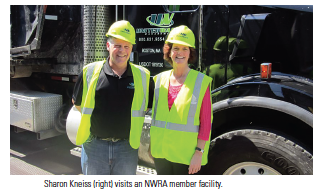Someone has to speak for the garbage.
Sharon Kneiss ’77 does it each and every day as the president and CEO of the National Waste & Recycling Association. But one of her proudest moments was when her outspoken passion for her job made its way into her personal life. She and her husband John were driving near their Bethesda, Maryland, neighborhood when yet another driver tried to maneuver — dangerously — around a garbage truck.
“My husband actually got out and chided the passing driver,” she recalled with a chuckle. “I guess I trained him well.”
A blatant disregard for the safety of these “undervalued” trash collectors, who are performing an important service in the community, drives Kneiss “absolutely crazy.”
A North Scranton native, who has lived and labored in Washington, D.C., for much of her life, Kneiss runs the trade association that represents companies that collect, manage and recycle waste, as well as those who supply to the industry, including waste equipment manufacturers, distributors and other service providers. She spends her days advocating for policies that support the environmentally responsible management of the nation’s trash, and the end game is sustainability.
“It’s all about how you manage the end of life for products,” she said, characterizing her job as sort of a palliative care for inanimate objects.
The behind-the-scenes life of trash, from birth to death to rebirth, is something Kneiss thinks about on a daily basis. “I call recycling an ‘innovators’ game,’” she said, noting the range of items born of garbage: fleece, carpeting and Trex® composite decking, for example, and even recycling bins themselves.
Firing the Flame
Kneiss credits her time at Scranton as the place she learned to focus on results, and was first driven by strong data. She fondly recalls one all-nighter when she and her chemistry classmates supervised the Wittig Reaction in the chemistry lab. This focus on good results, she said, translated into her eventual work on the life cycle of trash, and the intensity and camaraderie she experienced helped prepare her for her roles as advocate and innovator. She also valued her Jesuit education, so much so that she eventually sent her son to a Jesuit high school.
Now, she’s glad to connect with fellow Scranton alumni in D.C., who are also colleagues, working in senior positions at trade associations. “It’s just wonderful to have that community,” she said. One such connection is Steve Sandherr ’80, CEO at Associated General Contractors of America, the largest trade association for the construction industry in America. Having known each other for 20 years, Sandherr and Kneiss exchange emails and have lunch often, discussing work and life. “She’s sharp, she’s professional, and she’s done a great job of growing her membership and advancing her association,” Sandherr said.
The Issues
To hear Kneiss, who also earned an MBA from the University of Pittsburgh, recount her career trajectory, working for the Petroleum Institute in the late ’80s, addressing the Resource Conservation & Recovery Act (RCRA), marked her first steps down the advocacy and policy road. RCRA authorized the Environmental Protection Agency (EPA) to control hazardous waste “from the cradle to the grave,” according to epa.gov. Amendments enabled the EPA to address potential environmental problems from underground petroleum tanks.
As vice president in the American Chemistry Council’s products divisions in the late 2000s, she worked to ensure that legislative and regulatory
decisions to address any chemical concerns were made based on good science. She also broke ground with partnerships and campaigns on critical issues. In one such partnership, with California government and conservation groups, she developed and introduced programs to increase plastics recycling and achieved a 30 percent increase in favorability ratings among influential residents.
Her stops along the way might lead a casual observer to conclude she’s been on both sides of issues. But according to Kneiss, her positions have always had one thing in common: “I’ve always been on the side of good science,” she said. “Each industry has its challenges, and the bottom line is each of these industries is working to do the right thing based on good data and good science.”
That’s not to say the “right thing” always gets the popular vote. Hydraulic fracturing, or fracking, for example, has divided minds in the Marcellus Shale regions. Kneiss is not an opponent. “Using good, sound and safe methods to extract gas is beneficial from an energy perspective for this country,” she said.
Landfills also get a bad rap, she said. “Landfills are an important aspect of waste handling and are highly engineered facilities that segregate waste from the environment. In addition, we extract landfill gas (methane) produced at many landfills and use that gas to power electricity or as fuel for CNG vehicles. There is enough gas extracted from landfills to power 1.2 million homes in this country.
Teachable Moments
Kneiss remembers returning to Scranton in 2005 to give a presentation about recycling. “Recycling has blossomed in the last 20 years,” she said, noting curbside community blue-bin collectionshave risen from 500 to more than 10,000 and are now available to about 70 percent of the population. Teaching the ins and outs in this business is essential.
Kneiss has been in the recycling and waste-management business long enough to have witnessed its evolution and speak to its cyclical nature. The industry has evolved “from treating waste asa health concern to treating waste as something from which you extract the greatest value,” she said, adding that recycling is actually a commodity business. That means recyclables are sold to entities that are going to make new products from what has been cast off. The problem right now, she said, is that “prices are very, very low.”
“One of the things we’re addressing is: How do you make the whole recycling business a sustainable business?” she said. That’s a question worth asking again and again because, as Kneiss points out, “This is an industry that touches every single person on this planet.



